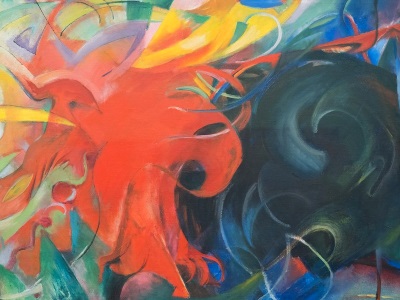Every little job that is done under the influence of the powers of eternity has a specific significance, a definite mission: the more strongly our work is flooded by eternal powers, the more deeply are we aware that this specific task is only a small service in connection with the great whole. At the same time, this small service is absolutely necessary to the whole. So we are certain of our way. We know that we cannot go any other way.
The first period of our communal work was our beginning and the first gathering, historically speaking from 1919 to the end of 1921. What drove us then to this lifestyle, to this type of activity and community? What was the purpose of this attempt? The World War was over; the so-called revolution had run its course. The Youth Movement and the peace movement still experienced a chaotic intensification of energy. And at this time we realized that all of this was an end, not a beginning. We longed to escape the tension, the confusion, the evil, our incapacity for community and the deadly animosity. Our longing was so shocking because we realized that we did not have the strength to live differently in a way that would answer our longing – to tread a path toward our goal of community and unity, of strength and joy, a path that in this degenerate creation would point to the new creation.
Then Jesus met us anew. Jesus met us in such perfect clarity, in such untainted brightness that we had to accept the practical possibility of his lifestyle as it was given to us. We recognized the Sermon on the Mount, the parables of Jesus and his words in sending out his disciples – above all, the Sermon on the Mount – as a character sketch of the people of the future and their way of community. We recognized it as a new planting of life from the Spirit, a new planting which like a tree, like light, like salt has to live according to its nature, its character. This purpose, this Spirit that will never abandon us, this fellowship of the kingdom is perfect love. This perfect love is free from legal rights, free from violence, free from moralism. Because it is perfect love, it is perfect order and perfect discipline. Here any defilement by the covetous will is impossible, either in the area of physical lust or the covetous desire for wealth and riches, because here our joy is defined by generous, ardent love, joy in creation, the mercy of the Father and in the Father’s will.
Poverty in our personal private lives, communism in our work, our common table and our common standard of living, working together and sharing the fruits of our labor – all of this is not decisive. What is decisive is the strength and the joy in all that is done and should be done. Love dawned on us as an overflowing power. It swept away all other powers of this earth and of human life, including the meaning of property and its laws. At that time there were many discussions of how community of all people could be attained, how a just division of property would be possible. It was clear to us that it was not possible without perfect love that is born of truth, without the church that is led by Christ. And just for this reason we felt it to be our responsibility to go this way of community in perfect love. We know that it was impossible to live in community without this power. But now it had to be lived because everywhere people felt the demand of community.
So we feel deeply united with people of all centuries who have felt the demand of community that comes from the love of Christ. We felt united with the first church in Jerusalem, with the earliest monastic movement, with the Waldensians and the Franciscans, with the Brothers of the Common Life and with the communistic Anabaptist movements of the Middle Ages. We felt united with the attempts of the Protestant and Catholic churches and outside of the churches. Our only question was whether these attempts, born of the spirit of faith and love, had all of humanity in mind. For one danger was painfully evident in all these groups. That is the danger of being exclusive, isolated, narrow, both spiritually and practically. Spiritually this can be seen in a narrowed horizon, in the inbreeding of a small group, in stereotyping customs. Practically it is evident in cutting oneself off as a small group of people that submits to being cut off. We have observed this narrowness both in Catholic orders and in evangelical groups of believers. We are convinced that the original revival movement was different, that the all-embracing power of love was decisive, the desire to reach everyone, overlooking nobody, and to live first and foremost for those who suffer most. The wish to seek people out was decisive. It cannot be otherwise if our love comes from the Creator who created all beings. Love must be all-embracing or it is nothing.
The second danger of all such communities is the charismatic danger. This is an exclusive love: a falling out between some and an unhealthy attraction between others who form an exclusive entity and cut themselves off from the whole. We saw clearly that communal attempts that were not based on faith broke up on this question because the greater magnet, the central sun, did not determine their course. So they had to fall for and drown in the paltry magnetism of petty relationships between individuals. This paltry magnetism cannot be overcome through strict rules and laws and commands but only by the greater magnet that dissolves these small parallel relationships. To be sure, they may still be there, and that explains certain smaller deviations. But the greater magnet is so decisive that the proximity of smaller magnets does not invalidate its precision. The important question is whether we are swinging around the central sun or not. Only when we are do we have the right to exist in the face of all limitations.
The third danger of communal life is to take offense at the personal weaknesses of other members. We are all imperfect. The imperfections of our characters and our gifts are varied, but we all have them. If people see each other only seldom, it is easy to overlook these imperfections and weaknesses of character. But if people are in the same room day after day, hour after hour, tied to the same job, it can become an inexpressible torture. “If you want to separate two friends, let them sleep in the same room for two months.” This has caused many communal attempts to break up. Irritation with each other, particularly the irritation between the married women who take care of the food and clothing needs, dissolves community. For this reason, talking about one another’s weakness causes tremendous damage in a community – not the fact that they are talked about but that through such talk one’s mind is chained to trivial thoughts. It ruins the character to concern oneself too much with the imperfections and weakness of individual people. How can this be overcome? By speaking about greater and more important things. Community is only possible if the primal demand of life and a longing for God and everything he created glows through us and gives us life. We can only live in community if we remain in the first love. “Consider what you have fallen from and do the deeds you did at first. I have one thing against you: you have forgotten the first love” (Rev. 2:4–5). It is only hard to live in community when we have lost the first love. It is easy to follow God’s commands. John says, “What is born of God overcomes the world” (1 John 5:4). Love comes through faith.
This is the sense in which we started when we found ourselves together in Sannerz. In this glow it was not difficult for us to live in the most confined space, to be satisfied with the most limited food and do the most menial work. It was not hard for us to switch gears every day for new people. Although we had no room for ourselves, the principle of the open door had to determine our course practically. We can only go the way of community if we can keep the door open. If we close the door to some private room of our life, it is no longer possible for our life to preserve its purpose. If thirty people sit together behind closed doors, nothing is won. The reason for propertylessness, for our communistic life, is that we are there for everyone who wants to be reached by us. The door that is always open and never selective is the missionary task of surrendered love. This is how we worked and lived at the beginning, and there was a powerful joy over our house. We had strong experiences of community with people we hardly knew because the door was open for everyone. They felt the rays of love and joy and allowed themselves to be gripped and flooded by them.
Before we started, we asked the proletarians in Berlin, “Do you think it would be better for us to plan our life experiment and open house in the city, or should we do it in the country?” They gave us the answer, “In the country.” People of the city need to get out to the country. Working class people will have times of unemployment and will visit such places that can be a real home for them. For the children of people who have sunk below a healthy standard of living, it is decisive that there are communities in the country that can offer them a healthy life for body, soul, and mind. So we moved into the country. At first there was no danger of our becoming isolated. But that has changed significantly in the meantime. Today we have to see the situation like this: We live in the country and hold our door wide open and at the same time try to do our utmost in intellectual, educational, and agricultural work. At the same time, we need to step out in mission, going out from our communal life, seeking people out wherever they are, including the big cities and the filthy corners, all of this presupposing the reality of the church.
Draft translation.
Article edited for length and clarity. View original document here: Three Dangers of Communal Life.


